(完整)高中英语情态动词讲解与练习(含答案),推荐文档
(完整版)高中英语情态动词讲解与练习(含答案),推荐文档
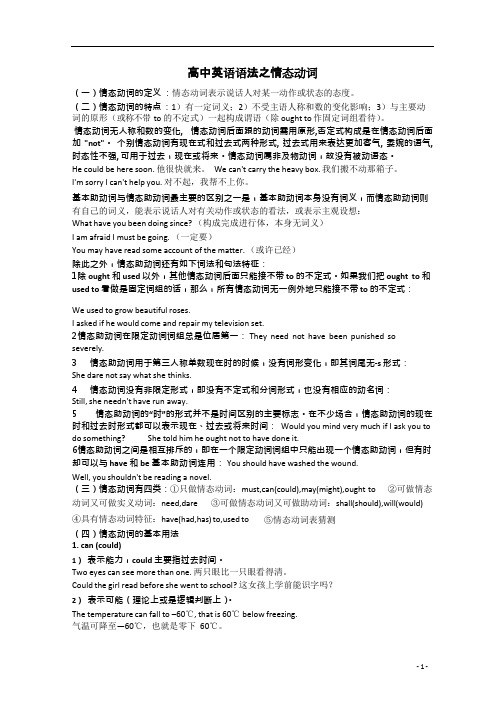
高中英语情态动词讲解与练习(含答案),成才系列

高中英语语法之情态动词(一)情态动词的定义:情态动词表示说话人对某一动作或状态的态度。
(二)情态动词的特点:1)有一定词义;2)不受主语人称和数的变化影响;3)与主要动词的原形(或称不带to的不定式)一起构成谓语(除ought to作固定词组看待)。
情态动词无人称和数的变化, 情态动词后面跟的动词需用原形,否定式构成是在情态动词后面加"not"。
个别情态动词有现在式和过去式两种形式, 过去式用来表达更加客气, 委婉的语气, 时态性不强, 可用于过去,现在或将来。
情态动词属非及物动词,故没有被动语态。
He could be here soon. 他很快就来。
We can't carry the heavy box. 我们搬不动那箱子。
I'm sorry I can't help you. 对不起,我帮不上你。
基本助动词与情态助动词最主要的区别之一是,基本助动词本身没有词义,而情态助动词则有自己的词义,能表示说话人对有关动作或状态的看法,或表示主观设想:What have you been doing since? (构成完成进行体,本身无词义)I am afraid I must be going. (一定要)You may have read some account of the matter. (或许已经)除此之外,情态助动词还有如下词法和句法特征:1)除ought和used以外,其他情态动词后面只能接不带to的不定式。
如果我们把ought to 和used to看做是固定词组的话,那么,所有情态动词无一例外地只能接不带to的不定式:We used to grow beautiful roses.I asked if he would come and repair my television set.2)情态助动词在限定动词词组总是位居第一:They need not have been punished so severely. 3)情态助动词用于第三人称单数现在时的时候,没有词形变化,即其词尾无-s形式:She dare not say what she thinks.4)情态动词没有非限定形式,即没有不定式和分词形式,也没有相应的动名词:Still, she needn't have run away.5)情态助动词的“时”的形式并不是时间区别的主要标志。
高中英语情态动词(一)解题方法和技巧及练习题含解析

高中英语情态动词(一)解题方法和技巧及练习题含解析一、单项选择情态动词1.Lack of sleep _______ lead to weakened immunity and memory, and also slow physical growth.A.shall B.must C.should D.can【答案】D【解析】【详解】考查情态动词辨析。
句意:睡眠不足会导致免疫力和记忆力下降,还会减缓身体发育。
A. shall将;B. must必须;C. should应该;D. can会,表示理论上或是逻辑判断上,用can,故选D。
2.We’ll make the final decision on our scheme. ______ you change your mind, please inform us as soon as possible.A.Should B.Were C.Would D.Had【答案】A【解析】【分析】【详解】考查虚拟语气。
句意:我们将对我们的计划做最后决定。
如果你改变主意,请尽快通知我们。
根据语境,此处用虚拟语气,表示与将来相反,从句用should+动词原形,省略if,should提前,陈述句是:If you should change your mind……。
故选A。
【点睛】虚拟语气中的倒装当虚拟条件句中含有 were,had,should时,可以将if省略,然后将 were,had,should,移至句首:1)If he should fail, he would kill himself.→Should he fail, he would kill himself.万一失败,他就会自杀。
2)If I were you, I would do it at once.→Were I you, I would do it at once.假若我是你,我就会马上做。
(英语)高一英语情态动词解题技巧及练习题(含答案)

(含答案)一、单项选择情态动词1.—It ’ s so hot and uncomfortable here! Why are your windows still closed? —Oh, I ’ m not to blame. They ___ open.A. shan ’t B. mustn ’t C. won ’t D . wouldn ’t【答案】C【解析】【详解】考查情态动词辨析。
句意:---这里又热又不舒服!你的窗户怎么还关着?---哦,不该责备我啊。
窗户打不开了。
shan' t= shall no意为不可,不应";mustn' t=must not意为不要”;wouldn't=would not意为不会,不愿意"。
won' t=will not意为不会,不能“,will在这里表示能力、功能。
例如:This auditorium will seat one thousand people. 这个礼堂能容纳一千人。
这句话意思是“这扇窗不能打开” ,故选 C 项。
2.—What ’ s wrong with you?—Oh, I am sick. I __ so much ice cream just now.A.shouldn ’ t eat B.mustn ’ t eatC.couldn ’ t have eaten D.shouldn ’ t have eaten【答案】D【解析】【详解】考查情态动词和虚拟语气。
句意:——你怎么了?——我生病了,我刚才不应该吃那么多冰激凌。
A. shouldn ' t eat应该吃;B. mustn' t e豢止吃;C. couldn ' t have eaten可能吃;D. shouldn ’ t heaveaten 本来不应该吃。
根据just now 可知,是发生在过去,故选D。
高考英语情态动词知识点解析含答案
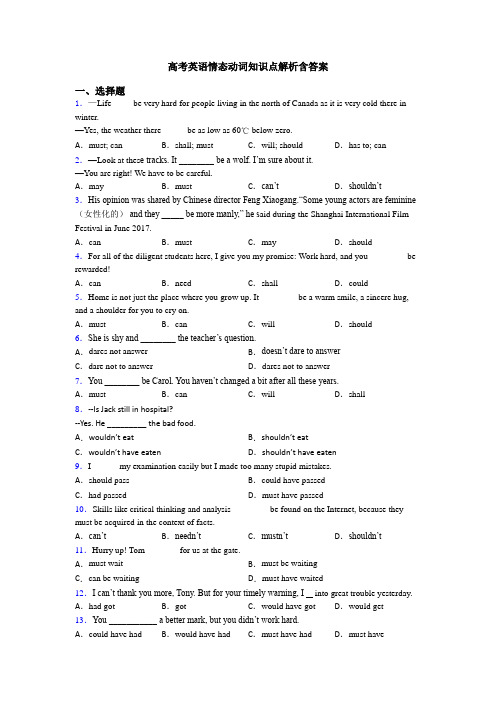
高考英语情态动词知识点解析含答案一、选择题1.—Life ____ be very hard for people living in the north of Canada as it is very cold there in winter.—Yes, the weather there _____ be as low as 60℃ below zero.A.must; can B.shall; must C.will; should D.has to; can 2.—Look at thes e tracks. It ________ be a wolf. I’m sure about it.—You are right! We have to be careful.A.may B.must C.can’t D.shouldn’t3.His opinion was shared by Chinese director Feng Xiaogang.“Some young actors are feminine (女性化的)and they _____ be more manly,” he s aid during the Shanghai International Film Festival in June 2017.A.can B.must C.may D.should4.For all of the diligent students here, I give you my promise: Work hard, and you ________ be rewarded!A.can B.need C.shall D.could5.Home is not just the place where you grow up. It ________ be a warm smile, a sincere hug, and a shoulder for you to cry on.A.must B.can C.will D.should6.She is shy and ________ the teacher’s question.A.dares not answer B.doesn’t dare to answerC.dare not to answer D.dares not to answer7.You ________ be Carol. You haven’t changed a bit after all these years.A.must B.can C.will D.shall8.--Is Jack still in hospital?--Yes. He _________ the bad food.A.wouldn’t eat B.shouldn’t eatC.wouldn’t have eaten D.shouldn’t have eaten9.I ______my examination easily but I made too many stupid mistakes.A.should pass B.could have passedC.had passed D.must have passed10.Skills like critical thinking and analysis ________ be found on the Internet, because they must be acquired in the context of facts.A.can’t B.needn’t C.mustn’t D.shouldn’t 11.Hurry up! Tom _______ for us at the gate.A.must wait B.must be waitingC.can be waiting D.must have waited12.I can’t thank you more, Tony. But for your timely warning, I into great trouble yesterday. A.had got B.got C.would have got D.would get 13.You ___________ a better mark, but you didn’t work hard.A.could have had B.would have had C.must have had D.must have14.He did not regret saying what he did but felt that he _________ it differently.A.could express B.would expressC.could have expressed D.must have expressed15.There are still 30 minutes ____, so we ____ hurry with lunch.A.going…needn’t B.to leave…don’t need C.leaving…needn’t to D.to go…needn’t16.—You look so tired. You________ late last night.—Yes. I had to to do an important report and stayed up till I completed it.A.should sleep B.must sleepC.should have slept D.must have slept17.(2018·天津) I can't find my purse. I___________ it in the supermarket yesterday, but I'm not sure.A.should leave B.must have leftC.might leave D.could have left18.The weather turned out to be fine yesterday. I ____________ the trouble to carry my umbrella with me.A.should have taken B.could have takenC.needn’t have taken D.mustn’t have taken19.Helen________ go on the trip with us, but she isn’t quite sure yet.A.shall B.may C.must D.can20.—Do you know where David is? I couldn’t find him anywhere.— Well. He ________ have gone far — his coat is still here.A.shouldn’t B.mustn’t C.can’t D.wouldn’t21.— Did Bob take the job in the supermarket? — No, but I think he _________.A.will have B.may have C.should have D.must have 22.We lost our way in that small village, otherwise we ________more places of interest yesterday.A.visited B.had visitedC.would visit D.would have visited23.He plays basketball very well. He_________ it a lot.A.may practise B.must practiseC.must have practised D.should have practiced24.I____________ go to a summer camp during the summer vacation, but I am not sure. A.might B.can C.must D.need25.It ___________ last night, for the road was very muddy.A.would have rained B.must have rained C.should have rained D.must rain【参考答案】***试卷处理标记,请不要删除一、选择题1.A解析:A【解析】【详解】考查情态动词。
高中英语情态动词练习题(情态动词表推测专练)带答案教程文件

1. “I thought you wouldn’t mind.”“Well, as a matter of fact I don’t, but you _____ me first.”A. should askB. should have askedC. must askD. must have asked2.“I called you yesterday. A woman answered, but I didn’t recognize her voice.”“Oh, it _____ my aunt Jean.”A. must beB. must have beenC. might beD. can have been3. That car nearly hit me; I ______.A. might be killedB. might have been killedC. may be killedD. may been killed4. It’s a very kind offer, but I really _____ ac cept it.A. mustn’tB. needn’tC. can’tD. don’t5. The police still haven’t found her, but they’re doing all they _____.A. mayB. canC. MustD. will6. You _____ practice the drums while the baby is sleeping.A. needn’tB. mightn’tC. mustn’tD. won’t7. You _____ him the news; he knew it already.A. needn’t tellB. needn’t have toldC. mightn’t tellD. mightn’t have told8. — I saw Mr. Sun at Tongyu Station this morning.—You ______. He’s still on holiday in Hawaii.A. c ouldn’t haveB. mustn’t haveC. shouldn’tD. needn’t9. Are you still here? You ______ home hours ago.A. should goB. should have goneC. might goD. may have gone10. “Look at these tracks. It _______ be a wolf.” “Don’t be so sure. I think it _______ be a fox.”A. must; mayB. may; mightC. need; mustD. could; need11. “Did Jim come?” “I don’t know. He _______ while I was out.”A. might have comeB. might comeC. mush have comeD. should have come12. I _______ have met him a long time ago. Both his name and face are very familiar.A. mayB. canC. wouldD. should13. “Shall we go shopping?” “Sorry, we _______ buy anything now because none of the shops are open.”A. mustn’tB. needn’tC. can’tD. shouldn’t14. They often go to the restaurants for meals. They _____ be very poor.A. mustn’tB. can’tC. may notD. needn’t15. I didn’t see her in the meeting room this morning. She ______ have spoken at the meeting.A. mustn’tB. shouldn’tC. needn’tD. couldn’t16. “Show me your permit, please.” “Oh, it’s not in my pocket. It ______.”A. might fall outB. could fall outC. should have fallen outD. must have fallen out17. — Has Li Lin started? He said he would join in the party.— He ______. He is a man of keeping his word.A. must have leftB. could have leftC. can’t comeD. won’t be coming18. “Why didn’t she come to the meeting yesterday?” “I’m not so sure. She ______ ill.”A. should beB. should have beenC. must beD. might have been19. Why did you just sit and watch? You _______ me.A. could helpB. should helpC. could have helpedD. must have helped20. “You ______ your teacher for help. He is kind-hearted.” “Yes. A whole day _______.”A. can ask, will wasteB. must have asked, had wastedC. could have asked, was wastedD. shouldn’t have asked, would be wasted21. “Is there a flight to London this evening?” “There _______ be. I’ll phone the airport and find it out.”A. mustB. mightC. wouldD. can22. Her brother be at home now, because he was seen playing basketball in the stadium just now.A. mustn’tB. needn’tC. can’tD. shouldn't23. —I can’t understand why our boss is late.—He the early bus.A. could missB. may have missedC. can have missedD. might miss24. — Excuse me, could you tell me where the Yajia Supermarket is?—It’s two blocks straight ahead. You ______ miss it.A. mustn’tB. can’tC. needn’tD. shouldn’t25. ______ Mr. Black _______ go to work by ferry before the bridge was built?A. Did; used toB. Use; toC. Did; use toD. Does; use to26. My English-Chinese dictionary has disappeared. Who _____ have taken it?A. shouldB. mustC. couldD. would27. See who is there! ______it be May?A. MayB. MustC. CanD. Will28. He must be in the classroom, _______ he?A. mustn’tB. can’tC. isn’tD. can29. He________ be in the garden. He must be in the room.A. can’tB. mustn’tC. will notD. may not30. John______ be a basketball player. He is much too short.A. mayB. mustn’tC. shouldD. can’t.答案:1-10 BBBCB CBABA 11-20 AACBD DADCC 21-30 BCBBC CCCAD。
高考英语语法专题复习:情态动词 知识点讲解与练习题(含答案)

高考英语语法专题复习:情态动词知识点讲解与练习题情态动词框架图常见情态动词:can/could; will/would; shall/should; may/might; need;dare; must; ought to, have to情态动词基本用法:肯定形式-----情态动词+ 动词原形/ + be done/have done否定形式:情态动词+not+ 动词原形一. 情态动词的基本用法(1) can、be able to 和could①can和be able to都表示能力,意思上没多大区别。
但can只有现在和过去时(could),而be able to则有更多的形式。
但当成功地完成某一具体动作时,通常不用could而用was/were able to来表示。
这时was/were able to 相当于managed to,表示经过一番努力,终于能够完成某事。
例句:Can you use chopsticks?The wounded man still was able to get to the village and was saved in the end.②can和couldcan和could表示猜测,一般用于疑问句和否定句.例句:--Can the news be true?-It can’t be true.③表示请求、允许(表请求时,口语中常用could 代替can 使语气更委婉,回答时用can)例子:Can I go now ?-Could I come to see you tomorrow?----Yes, you can. (否定回答可用No, I’m afraid not.)④表示惊异、怀疑、不相信的态度(主要用于否定句、疑问句或感叹句中)例子:How can that be true? I can’t believe my eyes and ears.How could you be so careless.?⑤ can 的特殊用法Can but 只好can’t but 不得不can’t …too 再….也不为过,越..越好can not but do 表示“不得不/只好做”can’t help but do 没有办法只有做can’t chose but do 没有选择只能做can do nothing but do 只能做have no choice but to do 别无选择而只有例子:I can but wait.I can’t but wait.You can’t be too patient to the customers.(2) may/might①may/might表示可能,但may比might可能性大。
(完整版)情态动词用法及其练习与答案
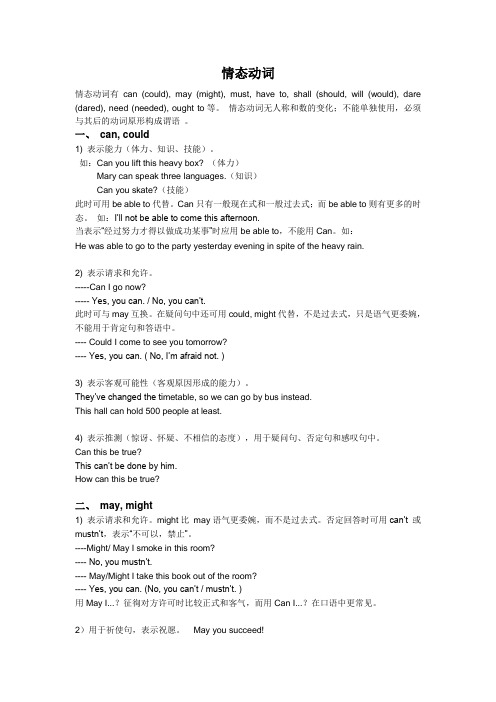
情态动词情态动词有can (could), may (might), must, have to, shall (should, will (would), dare (dared), need (needed), ought to等。
情态动词无人称和数的变化;不能单独使用,必须与其后的动词原形构成谓语。
一、can, could1) 表示能力(体力、知识、技能)。
如:Can you lift this heavy box? (体力)Mary can speak three languages.(知识)Can you skate?(技能)此时可用be able to代替。
Can只有一般现在式和一般过去式;而be able to则有更多的时态。
如:I’ll not be able to come this afternoon.当表示“经过努力才得以做成功某事”时应用be able to,不能用Can。
如:He was able to go to the party yesterday evening in spite of the heavy rain.2) 表示请求和允许。
-----Can I go now?----- Yes, you can. / No, you can’t.此时可与may互换。
在疑问句中还可用could, might代替,不是过去式,只是语气更委婉,不能用于肯定句和答语中。
---- Could I come to see you tomorrow?---- Yes, you can. ( No, I’m afraid not. )3) 表示客观可能性(客观原因形成的能力)。
They’ve changed the ti metable, so we can go by bus instead.This hall can hold 500 people at least.4) 表示推测(惊讶、怀疑、不相信的态度),用于疑问句、否定句和感叹句中。
【英语】高中英语情态动词解题技巧分析及练习题(含答案)及解析
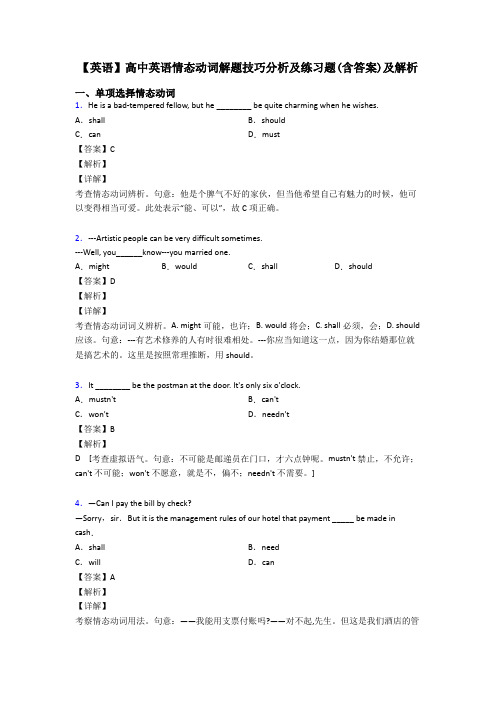
【英语】高中英语情态动词解题技巧分析及练习题(含答案)及解析一、单项选择情态动词1.He is a bad-tempered fellow, but he ________ be quite charming when he wishes.A.shall B.shouldC.can D.must【答案】C【解析】【详解】考查情态动词辨析。
句意:他是个脾气不好的家伙,但当他希望自己有魅力的时候,他可以变得相当可爱。
此处表示“能、可以”,故C项正确。
2.---Artistic people can be very difficult sometimes.---Well, you______know---you married one.A.might B.would C.shall D.should【答案】D【解析】【详解】考查情态动词词义辨析。
A. might可能,也许;B. would将会;C. shall必须,会;D. should 应该。
句意:---有艺术修养的人有时很难相处。
---你应当知道这一点,因为你结婚那位就是搞艺术的。
这里是按照常理推断,用should。
3.It ________ be the postman at the door. It's only six o'clock.A.mustn't B.can'tC.won't D.needn't【答案】B【解析】D[考查虚拟语气。
句意:不可能是邮递员在门口,才六点钟呢。
mustn't 禁止,不允许;can't 不可能;won't 不愿意,就是不,偏不;needn't 不需要。
]4.—Can I pay the bill by check?—Sorry,sir.But it is the management rules of our hotel that payment _____ be made in cash.A.shall B.needC.will D.can【答案】A【解析】【详解】考察情态动词用法。
2021届 高中英语语法--情态动词复习+练习含答案
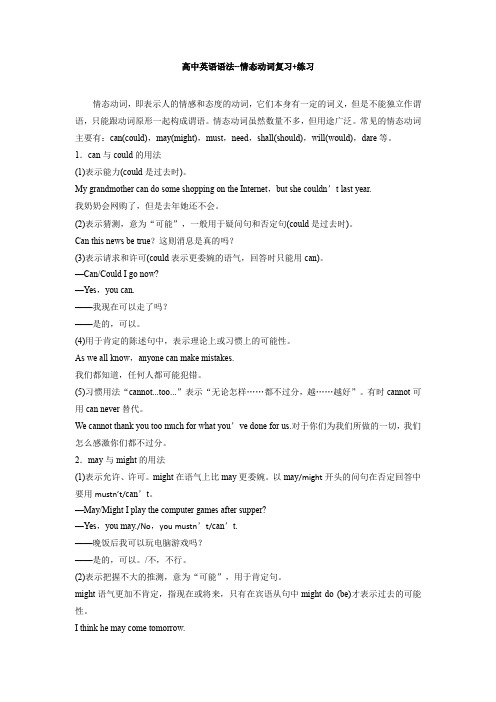
高中英语语法--情态动词复习+练习情态动词,即表示人的情感和态度的动词,它们本身有一定的词义,但是不能独立作谓语,只能跟动词原形一起构成谓语。
情态动词虽然数量不多,但用途广泛。
常见的情态动词主要有:can(could),may(might),must,need,shall(should),will(would),dare等。
1.can与could的用法(1)表示能力(could是过去时)。
My grandmother can do some shopping on the Internet,but she couldn’t last year.我奶奶会网购了,但是去年她还不会。
(2)表示猜测,意为“可能”,一般用于疑问句和否定句(could是过去时)。
Can this news be true?这则消息是真的吗?(3)表示请求和许可(could表示更委婉的语气,回答时只能用can)。
—Can/Could I go now?—Yes,you can.——我现在可以走了吗?——是的,可以。
(4)用于肯定的陈述句中,表示理论上或习惯上的可能性。
As we all know,anyone can make mistakes.我们都知道,任何人都可能犯错。
(5)习惯用法“cannot...too...”表示“无论怎样……都不过分,越……越好”。
有时cannot可用can never替代。
We cannot thank you too much for what you’ve done for us.对于你们为我们所做的一切,我们怎么感激你们都不过分。
2.may与might的用法(1)表示允许、许可。
might在语气上比may更委婉。
以may/might开头的问句在否定回答中要用mustn’t/can’t。
—May/Might I play the computer games after supper?—Yes,you may./No,you mustn’t/can’t.——晚饭后我可以玩电脑游戏吗?——是的,可以。
完整版英语情态动词专题练习(及答案)含答案
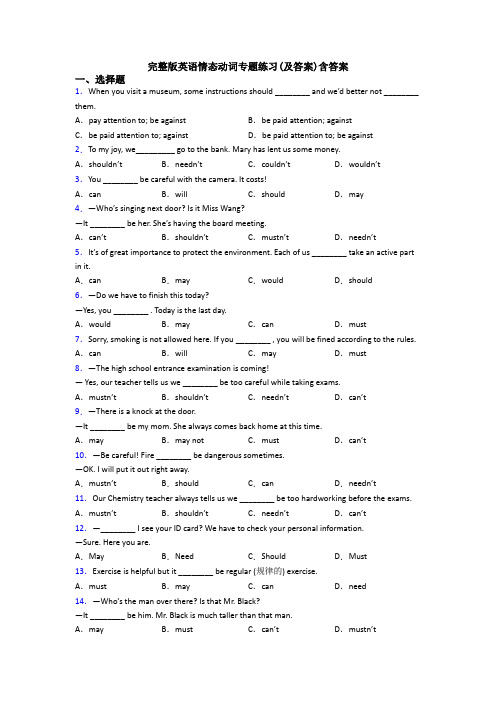
完整版英语情态动词专题练习(及答案)含答案一、选择题1.When you visit a museum, some instructions should ________ and we’d better not ________ them.A.pay attention to; be against B.be paid attention; againstC.be paid attention to; against D.be paid attention to; be against2.To my joy, we_________ go to the bank. Mary has lent us some money.A.shouldn’t B.needn’t C.couldn’t D.wouldn’t3.You ________ be careful with the camera. It costs!A.can B.will C.should D.may 4.—Who’s singing next door? Is it Miss Wang?—It ________ be her. She’s having the board meeting.A.can’t B.shouldn’t C.mustn’t D.needn’t5.It’s of great importance to protect the environment. Each of us ________ take an active part in it.A.can B.may C.would D.should6.—Do we have to finish this today?—Yes, you ________ . Today is the last day.A.would B.may C.can D.must7.Sorry, smoking is not allowed here. If you ________ , you will be fined according to the rules. A.can B.will C.may D.must8.—The high school entrance examination is coming!— Yes, our teacher tells us we ________ be too careful while taking exams.A.mustn’t B.shouldn’t C.needn’t D.can’t 9.—There is a knock at the door.—It ________ be my mom. She always comes back home at this time.A.may B.may not C.must D.can’t10.—Be careful! Fire ________ be dangerous sometimes.—OK. I will put it out right away.A.mustn’t B.should C.can D.needn’t11.Our Chemistry teacher always tells us we ________ be too hardworking before the exams. A.mustn’t B.shouldn’t C.needn’t D.can’t12.—________ I see your ID card? We have to check your personal information.—Sure. Here you are.A.May B.Need C.Should D.Must 13.Exercise is helpful but it ________ be regular (规律的) exercise.A.must B.may C.can D.need 14.—Who’s the man over there? Is that Mr. Black?—It ________ be him. Mr. Black is much taller than that man.A.may B.must C.can’t D.mustn’t15.A lot of online resources ________ be used either by teachers at school or parents at home. A.can B.should C.need D.must16.— Zoe, what do you think is the greatest advantage of shopping online?— At least I ______ spend much time going from shop to shop.A.shouldn’t B.can’t C.needn’t D.mustn’t 17.Please don't make so much noise. I ________ hear the speaker very well.A.needn't B.can't C.shouldn't D.mustn't 18.—Amy, I hear you've got many foreign coins._______ I have a look?—Of course, I'll fetch them for you.A.May B.MustC.Should D.Need19.When I was young, my father ___________ take me to climb the hill which was not far from our house.A.may B.must C.would D.should 20.—Shall we go camping this summer holiday?—Nothing________be better.A.should B.could C.must D.may21.My bike was broken yesterday,so I____walk home.A.might B.had to C.must D.could 22.—Would you please________in that way? That’s not safe!—Sorry. I won’t do it any more.A.not driving B.not to drive C.no driving D.not drive 23.Dr. Zhong Nanshan once said, "To prevent the spread of this disease, we________never be too careful."A.can B.may C.must D.should 24.Think twice before making a decision, or you __________ get into trouble.A.may B.can't C.shouldn't D.mustn't25.— Is Lang Lang going to perform at Art Center this Friday?— Yes. It ________ be him. He has been here for three days.A.might B.must C.mustn’t D.may26.— Mum, why do I have to wash hands so many times a day?—You ________ be too careful, for your health.A.can’t B.mustn’t C.may not D.needn’t27.You ________ require others to do with the problem like you. Everyone has his own way. A.mustn’t B.needn’t C.may not D.shouldn’t28.—I must go to school today, ________?—No, you ________.You can go as soon as you get well.A.mustn’t I;needn’t B.needn’t I;needn’tC.mustn’t I;mustn’t D.needn’t I;mustn’t29.—Must the children leave at six tomorrow morning?—No, they _______. They can have more time to get ready for the trip.A.can’t B.needn’t C.mustn’t D.may not 30.—Mum, why do I have to wear a mask before entering the supermarket?—For your health and safety, you ________ be too careful.A.shouldn’t B.can’t C.mustn’t D.needn’t31.A hard-working man ________ become a great scientist, but a great scientist ________ be a hard-working man.A.can’t; can B.may not; must C.can’t; must D.may not; can 32.According to the rule, used batteries ________ be dropped in the red bin for harmful wastes. A.may B.would C.should D.might33.You _________ smoke here! Look at the sign. It says "No smoking".A.needn't B.mustn't C.can D.may34.— Listen! Tom ________ be listening to the music while doing his homework.—Let’s go upstairs to remind him to turn it off.A.should B.could C.would D.must35.—Must I finish all my homework today, Mum?—No, you ________, my dear. You can finish some tomorrow if you like.A.needn’t B.shouldn’t C.can’t D.mustn’t36.We've discussed every detail of this plan and have got everything ready. But still something ________ go wrong. We still have to be very careful.A.must B.should C.would D.may37.You ________ drive after drinking alcohol(酒). It’s against the law.A.mustn’t B.needn’t C.couldn’t D.wouldn’t 38.Most young people like shopping online because they ________ spend much time going from shop to shop.A.needn’t B.can’t C.mustn’t D.shouldn’t 39.Hurry up, or we ________ miss the beginning of the film.A.should B.must C.may D.have to40.I think all the students love the weekends because, to them, they ________ get up early on Saturdays or Sundays.A.mustn’t B.don’t need C.needn’t D.can’t41.— Is the boy over there Tom? He often wears a jacket like that.— It _______ be him. He is absent from school today.A.needn’t B.shouldn’t C.mustn’t D.can’t42.—Shall I tell him the change of the time right now?—I’m afraid you ________, otherwise he will be late for the meeting.A.can B.may C.must D.need43.—Will dad arrive home at 6 o’clock to have dinner with us this evening?— I think he will, but he ________ not. Sometimes he works extra hours.A.can B.must C.need D.may 44.—Seventy dollars for such a dress! You ________ be joking!—I’m serious. It’s made of silk from Hangzhou.A.must B.need C.will D.can 45.—Excuse me. I haven’t finished reading the book yet. May I keep it a bit longer?— Sorry, you ________. You must return it on time.A.needn’t B.can’t C.won’t D.shouldn’t 46.— The sandstorm in Beijing is so serious this year.— Yes, I wonder when we ________ worry about the air we breathe.A.can’t B.mustn’t C.needn’t D.shou ldn’t 47.For the safety of the passengers, objects like guns ________ be carried on board.A.may not B.needn’t C.might not D.mustn’t 48.—The article says that a person’s animal sign decides his personality.—You ________ read it for fun, but don’t believe in that.A.can B.must C.shouldn’t D.needn’t49.— What do you think of the show yesterday?— Some of them were really good but others ________ be better.A.will B.must C.need D.can50.—Suzy described every detail of the accident just now.—Her memory ________ be completely back.A.shall B.need C.must D.could【参考答案】***试卷处理标记,请不要删除一、选择题1.D解析:D【详解】句意:当你参观博物馆时,应该注意一些说明,我们最好不违反它们。
高考英语专题情态动词知识点全集汇编及答案解析
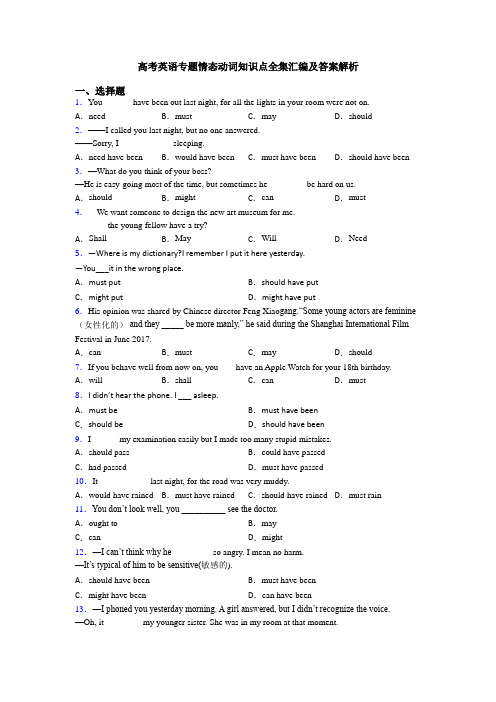
高考英语专题情态动词知识点全集汇编及答案解析一、选择题1.You ______ have been out last night, for all the lights in your room were not on.A.need B.must C.may D.should2.——I called you last night, but no one answered.——Sorry, I____________ sleeping.A.need have been B.would have been C.must have been D.should have been 3.—What do you think of your boss?—He is easy-going most of the time, but sometimes he ________ be hard on us.A.should B.might C.can D.must4.---We want someone to design the new art museum for me.---_____ the young fellow have a try?A.Shall B.May C.Will D.Need 5.—Where is my dictionary?I remember I put it here yesterday.—You___it in the wrong place.A.must put B.should have putC.might put D.might have put6.His opinion was shared by Chinese director Feng Xiao gang.“Some young actors are feminine (女性化的)and they _____ be more manly,” he said during the Shanghai International Film Festival in June 2017.A.can B.must C.may D.should7.If you behave well from now on, you ___ have an Apple Watch for your 18th birthday. A.will B.shall C.can D.must8.I didn’t hear the phone. I ___ asleep.A.must be B.must have beenC.should be D.should have been9.I ______my examination easily but I made too many stupid mistakes.A.should pass B.could have passedC.had passed D.must have passed10.It ___________ last night, for the road was very muddy.A.would have rained B.must have rained C.should have rained D.must rain 11.You don’t look well, you __________ see the doctor.A.ought to B.mayC.can D.might12.—I can’t think why he________ so angry. I mean no harm.—It’s typical of him to be sensitive(敏感的).A.should have been B.must have beenC.might have been D.can have been13.—I phoned you yesterday morning. A girl answered, but I didn’t recognize the voice.—Oh, it ________ my younger sister. She was in my room at that moment.A.must have been B.should have beenC.could have been D.may have been14.The heavy rain may ______ the landslide last night.A.accounts for B.accounted forC.have accounted for D.accounting for15.(2018·天津) I can't find my purse. I___________ it in the supermarket yesterday, but I'm not sure.A.should leave B.must have leftC.might leave D.could have left16.One of our rules is that every student _______ wear school uniform while at school. A.might B.couldC.shall D.will17.(2018·北京) In today’s information age, the loss of data _________ cause serious problems for a company.A.need B.shouldC.can D.must18.The weather turned out to be fine yesterday. I ____________ the trouble to carry my umbrella with me.A.should have taken B.could have takenC.needn’t have taken D.mustn’t have taken19.The lady ________ have done something wrong, because she is looking guilty.A.would B.should C.can D.must20.I____________ go to a summer camp during the summer vacation, but I am not sure. A.might B.can C.must D.need21.—Is there a holiday recently?—There_____ be. It has been informed that we will continue to study for another three weeks. A.won’t B.mustn’t C.may not D.can’t22.As you worked late last night, you __________ have come this morning.A.may not B.can’t C.mustn’t D.needn’t23.—Do you know where Tony is?—He _________ in the living room. I saw him there just now.A.shall be B.should have been C.might have been D.must be24.It was so noisy that we hear ourselves speak.A.couldn’t B.shouldn’tC.mustn’t D.needn’t25.Sir, you ____ be sitting in this waiting room. It is for women and children only. A.shouldn’t B.will C.won’t D.needn’t【参考答案】***试卷处理标记,请不要删除一、选择题1.B解析:B【解析】【详解】考查情态动词的用法。
高考英语情态动词讲解及习题(附答案)
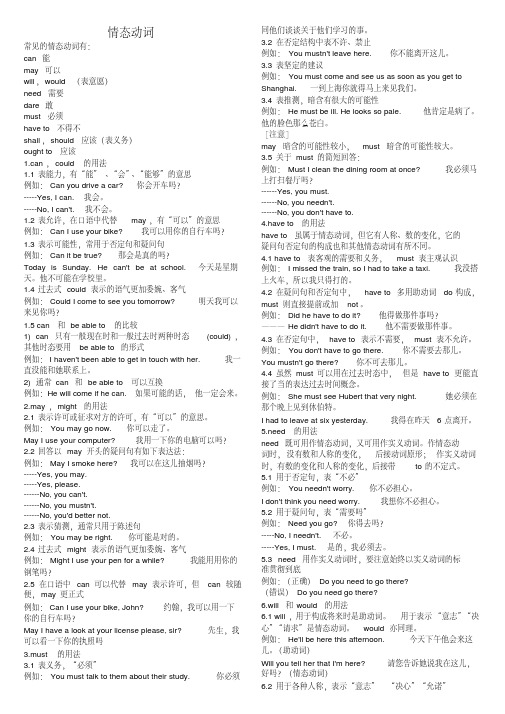
情态动词常见的情态动词有:can 能may 可以will,would (表意愿)need 需要dare 敢must 必须have to 不得不shall,should 应该(表义务)ought to 应该1.can,could 的用法1.1表能力,有“能”、“会”、“能够”的意思例如:Can you drive a car? 你会开车吗?-----Yes, I can. 我会。
-----No, I can't. 我不会。
1.2表允许,在口语中代替may,有“可以”的意思例如:Can I use your bike?我可以用你的自行车吗?1.3表示可能性,常用于否定句和疑问句例如:Can it be true?那会是真的吗?Today is Sunday. He can't be at school.今天是星期天。
他不可能在学校里。
1.4过去式could表示的语气更加委婉、客气例如:Could I come to see you tomorrow?明天我可以来见你吗?1.5 can 和be able to 的比较1) can 只有一般现在时和一般过去时两种时态(could),其他时态要用be able to的形式例如:I haven't been able to get in touch with her.我一直没能和她联系上。
2) 通常can 和be able to 可以互换例如:He will come if he can.如果可能的话,他一定会来。
2.may,might的用法2.1表示许可或征求对方的许可,有“可以”的意思。
例如:You may go now.你可以走了。
May I use your computer?我用一下你的电脑可以吗?2.2回答以may开头的疑问句有如下表达法:例如:May I smoke here? 我可以在这儿抽烟吗?-----Yes, you may.-----Yes, please.------No, you can't.------No, you mustn't.------No, you'd better not.2.3表示猜测,通常只用于陈述句例如:You may be right.你可能是对的。
最新高中必备英语情态动词技巧全解及练习题(含答案)

最新高中必备英语情态动词技巧全解及练习题(含答案)一、单项选择情态动词1.would可以表达过去常常做的事,过去习惯发生的动作:Pirates would bury gold in a cave. 海盗们常常把黄金藏在山洞中。
We would take a walk along the river. 我们过去常常沿河散步。
3. would后接like、love、mind等动词,表示要求、邀请、希望或询问,此时不是说过去,而是对现在的询问:Would you like to come to my party? 你愿意来我的派对吗?Would you mind coming with us? 你介意和我们一起吗?比如本题,would 表示婉转的请求,征求对方的意见,故选A。
2.I’m sorry, but you _____ go wrong. There’s no such man here.A.need B.can C.must D.will【答案】C【解析】【详解】考查情态动词。
句意:很抱歉,但是你一定是弄错了。
这儿没有这么个人。
A. need需要;B. can能够;C. must必须;D. will将会。
must指有把握的推测,“一定;必定”,结合下文There’s no such man here.可知一定是弄错了。
故选C。
3.Keep up your spirits even if you _____ fail hundreds of times.A.must B.needC.may D.should【答案】C【解析】【详解】考查情态动词。
A. must必须;B. need需要;C. may可能,或许;D. should应该。
句意:即使失败了几百次,也要振作起来。
此处表示一种不确定的推测,故选C。
4.—You rang me up at about 10:00 last night, didn't you?—No, I didn't phone you. It someone else.A.must have been B.could be C.must be D.could have been 【答案】A【解析】【详解】考查情态动词+have done。
【英语】高一英语情态动词答题技巧及练习题(含答案)含解析
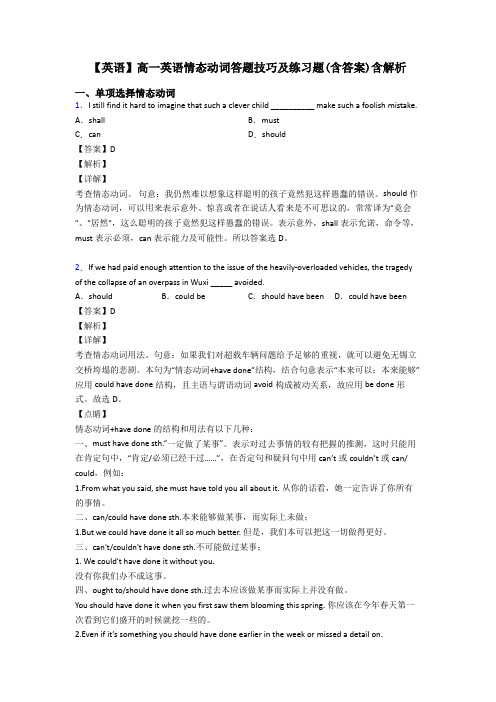
【英语】高一英语情态动词答题技巧及练习题(含答案)含解析一、单项选择情态动词1.I still find it hard to imagine that such a clever child __________ make such a foolish mistake. A.shall B.mustC.can D.should【答案】D【解析】【详解】考查情态动词。
句意:我仍然难以想象这样聪明的孩子竟然犯这样愚蠢的错误。
should 作为情态动词,可以用来表示意外、惊喜或者在说话人看来是不可思议的,常常译为"竟会"、"居然",这么聪明的孩子竟然犯这样愚蠢的错误。
表示意外,shall表示允诺,命令等,must表示必须,can表示能力及可能性。
所以答案选D。
2.If we had paid enough attention to the issue of the heavily-overloaded vehicles, the tragedy of the collapse of an overpass in Wuxi _____ avoided.A.should B.could be C.should have been D.could have been 【答案】D【解析】【详解】考查情态动词用法。
句意:如果我们对超载车辆问题给予足够的重视,就可以避免无锡立交桥垮塌的悲剧。
本句为“情态动词+have done”结构,结合句意表示“本来可以;本来能够”应用could have done结构,且主语与谓语动词avoid构成被动关系,故应用be done形式。
故选D。
【点睛】情态动词+have done的结构和用法有以下几种:一、must have done sth.“一定做了某事”。
表示对过去事情的较有把握的推测,这时只能用在肯定句中,“肯定/必须已经干过……”,在否定句和疑问句中用can’t或couldn’t或can/ could,例如:1.From what you said, she must have told you all about it. 从你的话看,她一定告诉了你所有的事情。
高中英语 情态动词讲解及练习(有答案)

情态动词讲解及练习一、can和could特别说明:(1)could用来表示请求时,语气委婉,主要用于疑问句,不能用于肯定句,答语应用can(即:could不能用于现在时态的简略答语中)。
如:——Could I use your dictionary?——Yes, you can.(否定回答可用:No, I’m afraid not.)(2)can和be able to辨析can(could)和be able to都可以表示能力,意思上没有区别。
但can只有现在式和过去式,而be able to则有更多的形式。
如:I’ve always wanted to able to speak fluent English.Those bags look really heavy, are you sure you’ll be able to carry them on your own?但是,表示在过去某时的某一场合经过一番努力,终于做成了某事,通常不用could,而用was/were able to来表示。
这时,was/were able to相当于managed to do或succeed in doing。
如:After the accident it was a long time before she was able to walk again.The fire was very big, but most people were able to escape from the building.(3) 惯用形式“cannot …too…”表示“无论怎么……也不(过分)”。
如:You cannot be too careful.你越小心越好。
惯用形式“cannot but+ 不定式(不带to)”表示“不得不,只好”。
如:I cannot but admire her determination.我不得不钦佩你的决心。
高考英语情态动词练习题50题(带答案)
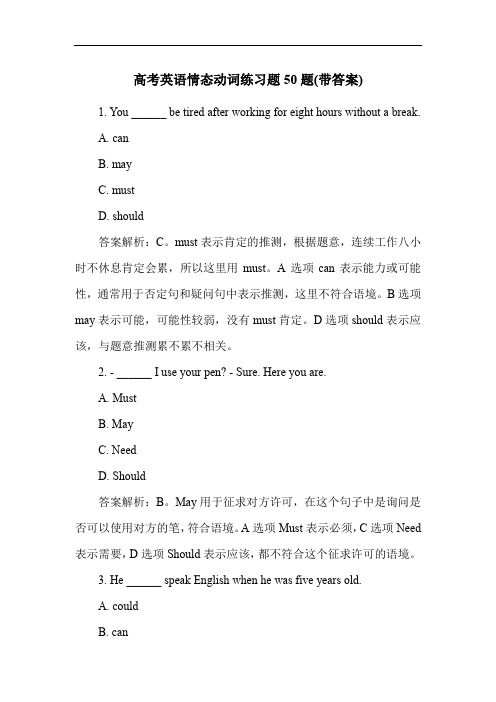
高考英语情态动词练习题50题(带答案)1. You ______ be tired after working for eight hours without a break.A. canB. mayC. mustD. should答案解析:C。
must表示肯定的推测,根据题意,连续工作八小时不休息肯定会累,所以这里用must。
A选项can表示能力或可能性,通常用于否定句和疑问句中表示推测,这里不符合语境。
B选项may表示可能,可能性较弱,没有must肯定。
D选项should表示应该,与题意推测累不累不相关。
2. - ______ I use your pen? - Sure. Here you are.A. MustB. MayC. NeedD. Should答案解析:B。
May用于征求对方许可,在这个句子中是询问是否可以使用对方的笔,符合语境。
A选项Must表示必须,C选项Need 表示需要,D选项Should表示应该,都不符合这个征求许可的语境。
3. He ______ speak English when he was five years old.A. couldB. canC. mayD. must答案解析:A。
could是can的过去式,表示过去的能力,句中提到他五岁的时候,是过去的时间,所以用could表示过去能说英语。
B选项can表示现在的能力。
C选项may表示可能,D选项must表示肯定的推测,都不符合这里表示过去能力的语境。
4. - Where is Tom? - He ______ be in the library. I'm not sure.A. canB. mayC. mustD. should答案解析:B。
may表示可能性,根据I'm not sure可知说话者不确定,只是一种可能,所以用may。
A选项can用于否定句和疑问句中表示推测,这里是肯定句。
高中情态动词讲解及练习有答案

情态动词情态动词表示说话人对某一动作或状态的态度,可以表示“可能”、“可以”、“需要”、“必须”或“应当”等之意。
情态动词没有人称和数的变化。
但不能单独作谓语动词用,必须和不带to 的不定式连用构成谓语动词。
只有情态动词ought要和带to的动词不定式连用,在句中作谓语用。
一.can/ be able tocan 表客观的能力,be able to表通过主观的努力,能够……eg. He is a native speaker of English, so he can speak English well.The fire was big, but he was able to escape.二.shall 用于二、三人称表命令,警告,威胁。
宣布法律,法规时用shall.eg. The judge declared that all the money shall belong to the wife.—What does the sign over there read?—“No person smoke or carry a lighted cigarette,cigar or pipe in this area.”A.willB.mayC.shallD.must三.1. should 表推测时指确定或期望,即合乎理想的情况或结果。
It’s nearly seven o’clock. Jack should be here at any moment.2. should 表“竟然”How should he do like this?四. 情态动词表推测。
1. must may might 用于肯定句,语气减弱。
can’t couldn’t 意为“不可能”,用于否定句,疑问句。
不存在mustn’t have doneeg. He must be at home.He may go out .He can’t be watching Tv.He couldn’t have finished the job yesterday, for he was badly ill.2. could have done 本可以……(实际没有)He could have been admitted to the college, but he failed.五.1. may 表征求对方意见。
高中英语语法情态动词详解及练习附答案

情态动词一、知识框架二、知识梳理(一)动词分类(二)情态动词基本用法As we all know, an experienced teacher can make mistakes. 众所周知,一位有经验的老师也会犯错。
You mustn’t smoke while you’re walking around in the wood.You could start a fire.情态动词表推测的反意疑问句情态动词表推测的反意疑问句,以情态动词后的时态为淮,如句子里有明确的时间状语,则以其为准。
E.g. 1. You must be hungry now, aren’t you?2. He must be watching TV, isn’t he ?3 Tom must have lived her for a long time, hasn’t he ?4. She must have arrived yesterday, didn’t she?(五)情态动词在if虚拟条件句中的运用三、课堂练习(一)选择1. You ________ give me a lift. I want to walk home for exercise.A.needn’tB.couldn’tC.can’tD.mustn’t2. Remember that in some countries, you ________take flowers of a certain colour, because they’re unlucky.A.could notB.needn’tC.may notD.mustn’t3. —Being young generations in China, _______they take up all of the challenges and opportunities that this country offers?—Absolutely.A. mustn’tB. mightn’tC. shouldn’tD. couldn’t4. —_________you interrupt now? Can’t you see I’m on the phone?—Sorry, sir, but it’s an emergency.A. CanB. ShouldC. MustD. Would5. It is said that people ________ reduce the risk of catching some serious diseases by exercising.A. mustB. canC. wouldD. need6. I was very surprised that that little child __________ have said such rude words to his parents.A. mightB. couldC. wouldD. should7. My phone _________ have been stolen while I was taking a bus. I can’t find it anywhere.A. canB. mustC. shouldD. would8. You ________ so much cash with you, you know — that shop accepted checks.A. couldn’t have takenB. wouldn’t have takenC. shouldn’t have takenD. needn’t have taken9. Without your help, we _________ our task on time. I cannot thank you enough.A. can’t finishB. couldn’t finishC. can’t have finishedD. couldn’t have finished10. —Bob didn’t pass this exam.—What a pity! He _________.A. should study hardB. should have studied hardC. would have studied hardD. could have studied hard(二)填空1. Tom, you __________ leave all your clothes on the floor like this!2. He__________ have completed his work; otherwise, he wouldn’t be enjoying himself by the seaside.3. There __________ be any difficulty about passing the road test since you have practiced a lot in the driving school.4. I __________ have been more than six years old when the accident happened.5. The World Wide Web is sometimes jokingly called the World Wide Wait because it __________ be very slow.6. —Lucy doesn’t mind lending you her dictionary.—She __________. I have already borrowed one.7. I was on the highway when this car went past followed by a police car. They __________(do) at least 150 kilometers an hour.8. We hope that as many people as possible __________ join us for the picnic tomorrow.9. We __________ have proved great adventurers, but we have done the greatest march ever made in the past ten years.10. Some aspects of a pilot’s job __________ be boring, and pilots often __________ work at inconvenient hours.11. — May I smoke here?— If you __________, choose a seat in the smoking section.12. The weather turned out to be fine yesterday. I __________(take)the trouble to carry my umbrella with me.13. — I think I’ll give Bob a ring.— You __________. You haven’t been in touch with him for ages.14.—Is Jack on duty today?—It __________ be him. It’s his turn tomorrow.15. In crowded places like airports and railway stations, you __________ take care of your luggage.16. She looks very happy. She __________ have passed the exam.17. Liza __________ well not want to go on the trip—she hates traveling.18. What a pity! Considering his ability and experience, he __________(do) better.19. Although this __________ sound like a simple task, great care is needed.20. Peter __________ be really difficult at times even though he’s a nice person in general.(三)翻译1.对父母而言,没有什么能与孩子的身心健康相比。
- 1、下载文档前请自行甄别文档内容的完整性,平台不提供额外的编辑、内容补充、找答案等附加服务。
- 2、"仅部分预览"的文档,不可在线预览部分如存在完整性等问题,可反馈申请退款(可完整预览的文档不适用该条件!)。
- 3、如文档侵犯您的权益,请联系客服反馈,我们会尽快为您处理(人工客服工作时间:9:00-18:30)。
高中英语语法之情态动词(一)情态动词的定义:情态动词表示说话人对某一动作或状态的态度。
(二)情态动词的特点:1)有一定词义;2)不受主语人称和数的变化影响;3)与主要动词的原形(或称不带to 的不定式)一起构成谓语(除ought to 作固定词组看待)。
情态动词无人称和数的变化, 情态动词后面跟的动词需用原形,否定式构成是在情态动词后面加"not"。
个别情态动词有现在式和过去式两种形式, 过去式用来表达更加客气, 委婉的语气, 时态性不强, 可用于过去,现在或将来。
情态动词属非及物动词,故没有被动语态。
He could be here soon. 他很快就来。
We can't carry the heavy box. 我们搬不动那箱子。
I'm sorry I can't help you. 对不起,我帮不上你。
基本助动词与情态助动词最主要的区别之一是,基本助动词本身没有词义,而情态助动词则有自己的词义,能表示说话人对有关动作或状态的看法,或表示主观设想:What have you been doing since? (构成完成进行体,本身无词义)I am afraid I must be going. (一定要)You may have read some account of the matter. (或许已经)除此之外,情态助动词还有如下词法和句法特征:1)除ought 和used 以外,其他情态动词后面只能接不带to 的不定式。
如果我们把ought to 和used to 看做是固定词组的话,那么,所有情态动词无一例外地只能接不带to 的不定式:We used to grow beautiful roses.I asked if he would come and repair my television set.2)情态助动词在限定动词词组总是位居第一:They need not have been punished so severely.3)情态助动词用于第三人称单数现在时的时候,没有词形变化,即其词尾无-s 形式:She dare not say what she thinks.4)情态动词没有非限定形式,即没有不定式和分词形式,也没有相应的动名词:Still, she needn't have run away.5)情态助动词的“时”的形式并不是时间区别的主要标志。
在不少场合,情态助动词的现在时和过去时形式都可以表示现在、过去或将来时间:Would you mind very much if I ask you to do something?She told him he ought not to have done it.6)情态助动词之间是相互排斥的,即在一个限定动词词组中只能出现一个情态助动词,但有时却可以与have 和be 基本助动词连用:You should have washed the wound.Well, you shouldn't be reading a novel.(三)情态动词有四类:①只做情态动词:must,can(could),may(might),ought to②可做情态动词又可做实义动词:need,dare③可做情态动词又可做助动词:shall(should),will(would)④具有情态动词特征:have(had,has) to,used to⑤情态动词表猜测(四)情态动词的基本用法1.can (could)1)表示能力,could 主要指过去时间。
Two eyes can see more than one. 两只眼比一只眼看得清。
Could the girl read before she went to school? 这女孩上学前能识字吗?2)表示可能(理论上或是逻辑判断上)。
The temperature can fall to –60℃, that is 60℃below freezing.气温可降至—60℃,也就是零下60℃。
He can´t (couldn´t) have enough money for a new car. 他不可能有足够的钱买新车。
You mustn´t smoke while you´re walking around in the wood. You could start a fire.在林子里走时勿吸烟,那样可能会引起火灾。
3)表示允许。
Can I have a look at your new pen? 我可以看一看你的新钢笔吗?He asked whether he could take the book out of the reading—room.他问他可不可以把书带出阅览室。
4)表惊异、怀疑、不相信等态度。
主要用于否定句、疑问句或感叹句中。
Where can (could) they have gone to? 他们会去哪儿了呢?He can´t (couldn´t) be over sixty. 他不可能超过六十岁。
How can you be so careless? 你怎么这么粗心?5)比较委婉客气地提出问题或陈述看法。
Can (Could) you lend me a hand? 帮我一把好吗?I´m afraid we couldn´t give you an answer today. 恐怕我们今天不能给你答复。
2.may (might)1)表允许,might 可以指过去时间,也可指现在时间,语气更委婉。
You may take whatever you like. 你喜欢什么就拿什么。
He told me that I might smoke in the room. 他告诉我可以在房间里抽烟。
May (Might) I ask for a photo of your baby? 我可以要一张你宝宝的照片吗?在回答以may 引起的问句时,多避免用这个词,而用其它方式,如Yes, please. / Certainly. / Please don´t ./ You´d better not. / No, you mustn´t.等,以免显得太严峻或不客气。
2)表可能(事实上)。
可以指过去时间,也可以指现在时间,但语气更加不肯定。
He may be at home. 他可能在家。
She may not know about it. 她可能不知道这件事。
He was afraid they might not agree with him. 他担心他们可能不同意他的意见。
They might be having a meeting, but I´m not sure. 他们有可能在开会,不过我不肯定。
3.must1)表示义务。
意为“必须”(主观意志)。
We must do everything step by step. 我们一切都必须循序渐进地做。
You mustn´t talk to her like that. 你不可能那样对她说话。
--Must we hand in our exercise—books now? 我们现在就要交练习本吗?--No, you needn´t. / No, you don´t have to. 不必。
(这种情况下,一般不用mustn´t)2)表示揣测。
意为“想必、准是、一定”等,只用于肯定句。
He must be ill. He looks so pale. 他准是病了。
他的脸色苍白。
She´s wearing a diamond necklace. She must have a lot of money.她戴着钻石项链,一定很有钱。
4.shall1)表征询意见,用于第一、第三人称疑问句。
Shall I get you some tea? 我给你点茶好吗?Shall the boy wait outside? 让那男孩在外面等吗?What shall we do this evening? 我们今晚做什么?2)表说话人的意愿,有“命令、允诺、警告、决心”等意思,用于第二、第三人称陈述句。
You shall do as I say. 按我说的做。
(命令)You shall have my answer tomorrow. 你明天可以得到我的答复。
(允诺)He shall be sorry for it one day, I tell you. 有一天他会后悔的,我告诉你。
(警告)Nothing shall stop us from carrying out the plan. 什么也不能阻止我们执行这项计划(决心)5.will1)表意愿,用于各种人称陈述句。
I will do anything for you. 我愿为你做任何事。
None is so blind as those who won´t see. 不愿看的人眼最瞎。
If you will read the book, I´ll lend it to you. 如果你愿意读这本书,我会把它借给你。
2)表请求,用于疑问句。
Will you close the window? It´s a bit cold. 请你把窗户关上好吗?有点冷。
Won´t you drink some more coffee? 再来一点咖啡好吗?3)表示某种倾向或习惯性动作。
Fish will die out of water. 鱼离开水就不能活。
The door won´t open. 这门打不开。
The boy will sit there hour after hour looking at the traffic go by.那男孩常常坐在那里好几个钟点,看着车辆行人通过。
6.should1)表义务。
意为“应该”(某件事宜于做),用于各种人称。
You should be polite to your teachers. 你对老师应该有礼貌。
You shouldn´t waste any time. 你不应该浪费时间。
2)表推测,意为“想必一定、照说应该、估计”等。
The film should be very good as it is starring first—class actors.这部新电影是一流演员主演的,估计拍得很好。
